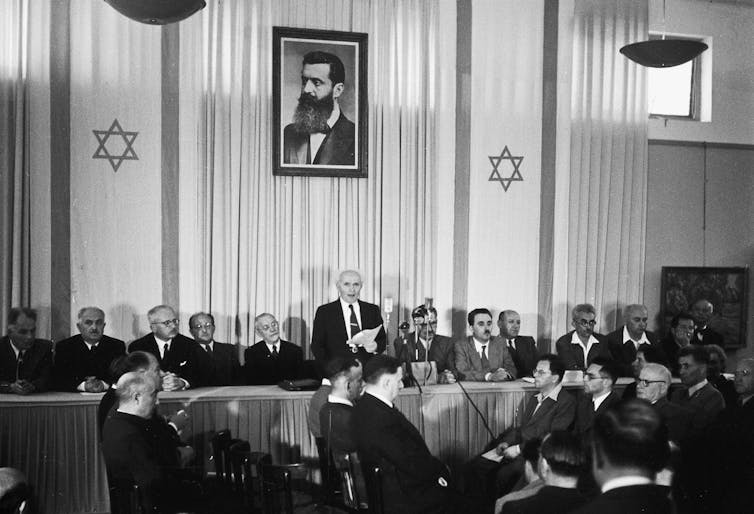Early last Thursday, July 19, while most Israelis were sleeping, Israel’s right-wing coalition government narrowly passed a highly controversial law that had been years in the making.
The so-called “nation-state law” legally enshrines Israel’s Jewish character and makes it one of the state’s guiding judicial principles, akin to a constitutional amendment in the United States.
The new law declares that Israel is “the national home of the Jewish people,” that only Jews have a right to national self-determination in Israel, that Jerusalem is the capital of Israel, and that Hebrew is the only official language – downgrading the official status of Arabic.
Among its other provisions, the most contentious one says that “the state views the development of Jewish settlement as a national value and will act to encourage and promote its establishment and consolidation.” Critics fear this deliberately vague language could be used to legitimize Jewish-only communities and even exclusive towns.
The one thing that proponents and opponents of the nation-state law agree on is that its passage is of profound and historic importance – representing a milestone in Israel’s 70-year history.

Prime Minister Benjamin Netanyahu proudly hailed it as “a pivotal moment in the annals of Zionism and the State of Israel.”
On the other side of the political spectrum, Ahmad Tibi, an Arab Knesset member who belongs to the Joint List party – a coalition of primarily Arab parties – bitterly denounced the law as “the end of democracy,” and “the official beginning of fascism and apartheid.”
As a scholar of Israeli society and politics, I think that both sides have overdramatized the new law’s significance, for their own political purposes. It is largely a declarative and symbolic measure, with no immediate, practical application.
Nevertheless, the law could eventually have far-reaching implications for Jewish-Arab relations within Israel and for Israeli-Palestinian relations.
From the beginning
Most of the new law’s provisions will have no impact because they are already contained in other laws.
There are, for example, numerous laws that codify and express Israel’s Jewish identity. The most famous is the Law of Return, passed in 1950, which automatically grants citizenship to any Jew emigrating to Israel.

Since its founding in 1948, Israel has declared itself a Jewish nation-state. Whereas most states see themselves as serving only the interests of their citizens, Israel’s Jewish identity means that its primary mission is to serve the Jewish people, wherever they live.
Consequently, Israel’s non-Jewish citizens – one in four Israelis – are of lesser importance. This has been most consistently apparent in the treatment by Israel’s governments of the country’s Arab minority, which comprises 21 percent of Israel’s population.
The Arab minority has long been discriminated against and neglected by the state. That fact was officially acknowledged in a groundbreaking report issued in 2003 by the Orr Commission, an Israeli government-appointed body headed by a former Supreme Court justice.
Although Arab citizens of Israel – most of whom also identify as Palestinian – have the same democratic rights as Israeli Jews, they have generally been treated as second-class citizens.
Despite the fact that Arabs have become more successful, more visible and more outspoken in recent years, they remain marginalized in Israeli society and politics, and there are still large inequalities between Arabs and Jews in many areas of life such as education, housing and employment. Worse, Arabs must contend with land confiscations, home demolitions, municipal underfunding, and both formal and informal discrimination. They are still treated and widely perceived as a demographic and security threat, a potential “fifth column” in Israel’s conflict with the Palestinians.
Enshrining inequality
Israel, therefore, has never been a truly liberal democracy that treats all its citizens equally regardless of their ethnicity or religion.
Instead, from the outset it has been an “ethnic democracy” or “ethnocracy” as scholars have labeled it, serving Jews first and foremost.
While Arab living standards have certainly risen over the years, Israel has never fully lived up to the promise contained in its Declaration of Independence to “foster the development of the country for the benefit of all its inhabitants,” and “ensure complete equality of social and political rights to all its inhabitants irrespective of religion, race or sex.”

Most Arab citizens of Israel have come to believe that they will never attain full equality with Israeli Jews as long as Israel defines itself as a Jewish state. Hence, they have increasingly advocated for Israel to redefine itself as a “state for all its citizens.”
The new nation-state law was primarily intended to counter such demands.
Avi Dichter, the Likud Knesset member who first proposed the bill and was one of its main sponsors, made that clear during the stormy Knesset debate over it.
Dichter said, “We are enshrining this important bill into a law today to prevent even the slightest thought, let alone attempt, to transform Israel to a country of all its citizens.”
In other words, the new law is aimed at preserving the status quo, not radically changing it. Rather than transform Israel into an undemocratic “apartheid state,” as some of its critics charge, the nation-state law is more likely to ensure that Israel cannot be easily transformed into a liberal democracy or a bi-national state.
The fact that the words “democracy and "equality” do not appear at all in the law is telling. Nor is there any recognition of the presence of a Palestinian-Arab minority in Israel. On the contrary, the new law implicitly denies their very existence as an indigenous national minority that also has a legitimate claim to national self-determination, or at least collective rights.
In doing so, the nation-state law will only anger, and further alienate, Israel’s Arab citizens. The message the law sends to them is unequivocal: This state is not yours and this land does not belong to you.
The law also delivers a clear message to Palestinians in the West Bank and East Jerusalem, who are now considering giving up their demand for a separate Palestinian state in favor of seeking equal citizenship within an expanded Israel – a “one-state solution” to the Israeli-Palestinian conflict.
By legally entrenching Israel’s Jewish character, and potentially legitimizing Jewish privileges when they are challenged in court, the law could be used to ensure that Israel remains a Jewish state and continues to give preference to Jews even if – or perhaps when – Israel officially annexes much of the West Bank and Jews become a minority within its borders.
Ultimately, the nation-state law’s long-term impact will depend upon how Israeli policymakers apply it, how judges interpret it, and how Palestinians in Israel and the occupied territories respond to it.

